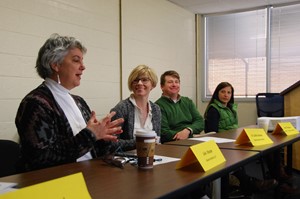Dr. Caitlin Dooley, Georgia Department of Education (DOE) Deputy Superintendent of Teaching and Learning, recently visited Thomas County Schools to learn more about what is needed to ensure all students in Georgia – in rural, suburban, and urban schools – have access to high quality Science Technology Engineering Arts and Mathematics (STEAM) education including computer science across all grades in K12.
Dr. Dooley’s visit started at the Thomas County Board of Education where she met with school principals and administrators. The group interacted as Dr. Dooley asked questions about Thomas County’s intensive computer science program that starts in Pre-K and continues through twelfth grade.
“Last week, I had the pleasure of seeing students in Thomas County while visiting several school districts in South Georgia,” Dr. Dooley said. “The county is a leader and innovator as it incorporates computer science education throughout elementary, middle, and high school.”
Following the meeting, Dr. Dooley was given a tour of several schools to witness first-hand the students’ exposure to the STEAM fields. Her tour began at Cross Creek Elementary where she observed students programming robots in the coding classroom.
Dr. Dooley and the group stopped by Thomas County Central to visit the AP Computer Science class to learn more about the full computer programming pathway being offered there. At her final stop, Dr. Dooley witnessed students in the technology exploratory course at Thomas County Middle School complete various projects using different coding languages. All of the schools shared how they incorporated the Project Lead the Way curriculum in their academic classes.
“Through the use of design challenges, innovative projects, and entrepreneurial experiences, students can learn how programming, networking, data, and hardware (like robots) can be created,” Dr. Dooley added. “I loved how the teacher [at Cross Creek] was using WeDos to challenge the students to build robots that can pull different items. The teacher was also asking students to analyze data about which items were easier and harder to pull. This is the kind of experience that engages students.”
Dr. Dooley shared with the group that the US Bureau of Labor estimates that by 2020, most jobs will be STEM or STEAM related, and about 70 percent of those jobs will require computer science.
Dr. Dooley said, “This doesn't just mean coding. It means that students need to understand how computers work, how they're made, and how they can be embedded into everyday items and activities to make living better. Whether a child grows up to be a farmer or fashion designer, their future will likely involve digital computing. So just like a child needs to learn about math because math is a part of our world, children need to learn about computing because computers are a part of our world.”
“We were delighted to showcase our K-12 computer science initiative to the Department of Education’s top leadership,” said Thomas County School Superintendent Dr. Dusty Kornegay. “Thomas County is clearly the leader in Southwest Georgia in terms of offering a comprehensive K-12 computer science and robotics curriculum. Our aim is for students who graduate from Central to be on equal footing with students from the state’s finest metropolitan prep schools when they enter highly competitive universities like Georgia Tech. We have assembled a top-notch team, and I am very proud of what they have accomplished,” he said.
Upon conclusion of the meeting, representatives from the Thomas County School System were invited to DOE to share their successes and collaborate with Dooley’s team.
